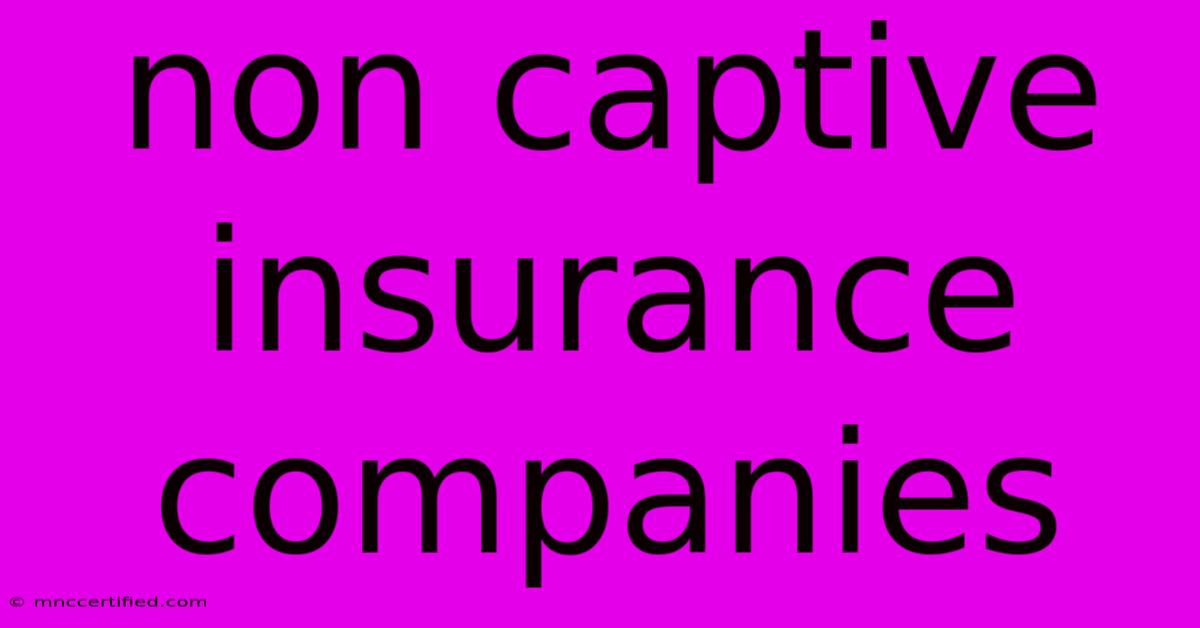Non Captive Insurance Companies

Table of Contents
Understanding Non-Captive Insurance Companies: A Comprehensive Guide
Non-captive insurance companies, also known as commercial insurers, represent the vast majority of the insurance market. Unlike captive insurers, which are insurance companies owned and operated by a specific parent company to insure its own risks, non-captive insurers sell insurance policies to the general public and businesses. This article delves into the intricacies of non-captive insurance companies, exploring their functions, benefits, and key distinctions from their captive counterparts.
What are Non-Captive Insurance Companies?
Non-captive insurance companies are independent, for-profit entities that operate in the open insurance market. They underwrite and manage risk for a diverse portfolio of clients, offering a wide array of insurance products. These products cater to various needs, from personal auto and home insurance to complex commercial policies covering liability, property, and other potential risks. Their primary goal is to profit by generating premiums and investing those premiums wisely.
Key Characteristics of Non-Captive Insurers:
- Independent Operation: They are not owned or controlled by a specific parent company.
- Diverse Client Base: They serve a wide range of individuals and businesses.
- Profit-Driven: Their main objective is financial gain through premium income and investment returns.
- Regulatory Oversight: They are heavily regulated by state and/or national insurance departments to ensure solvency and consumer protection.
- Product Diversification: They offer a variety of insurance products to meet diverse customer needs.
How Non-Captive Insurance Companies Differ from Captive Insurers
The core distinction lies in ownership and the clientele served. While non-captive insurers are independent and cater to a wide range of clients, captive insurers are wholly owned subsidiaries designed to manage the risks of their parent company. This leads to several key differences:
| Feature | Non-Captive Insurer | Captive Insurer |
|---|---|---|
| Ownership | Independent, publicly traded, or privately held | Wholly owned subsidiary of a parent company |
| Clients | Diverse range of individuals and businesses | Primarily the parent company and its affiliates |
| Profit Motive | Primarily profit-driven | Risk management and potential cost savings are primary goals |
| Regulation | Subject to extensive state and/or national regulations | Often subject to less stringent regulatory oversight |
| Premium Rates | Market-driven, influenced by risk assessment | Potentially more flexible and customized |
Benefits of Using Non-Captive Insurance Companies
For most individuals and businesses, non-captive insurers offer several advantages:
- Wide Range of Products: Access to a broader selection of insurance products tailored to various needs and risk profiles.
- Established Reputation and Financial Stability: Many established non-captive insurers have a long history and strong financial standing, offering greater security.
- Competitive Pricing: Competition in the market often leads to more competitive premiums.
- Specialized Expertise: Non-captive insurers often have specialized teams and expertise in underwriting and managing various types of risk.
- Ease of Access: Policies are readily available through various channels, including agents, brokers, and online platforms.
Choosing the Right Non-Captive Insurer
Selecting the right non-captive insurer involves careful consideration of several factors:
- Financial Stability: Assess the insurer's financial strength ratings from reputable agencies.
- Policy Coverage: Carefully review the policy details and ensure adequate coverage for your specific needs.
- Customer Service: Look for an insurer with a positive reputation for customer service and claims handling.
- Price: Compare quotes from multiple insurers to find the most competitive price without compromising coverage.
- Reputation: Research reviews and ratings to gauge the insurer's overall reputation and customer satisfaction.
Conclusion
Non-captive insurance companies form the backbone of the insurance industry, providing essential risk management solutions to individuals and businesses alike. Understanding their operations, benefits, and differences from captive insurers is crucial for making informed decisions about insurance protection. By carefully considering factors like financial stability, coverage, and customer service, individuals and businesses can choose a reliable and suitable non-captive insurer to meet their specific needs. Remember to always compare quotes and read policy details thoroughly before making a commitment.

Thank you for visiting our website wich cover about Non Captive Insurance Companies. We hope the information provided has been useful to you. Feel free to contact us if you have any questions or need further assistance. See you next time and dont miss to bookmark.
Featured Posts
-
Gifts For Cryptocurrency Lovers
Nov 23, 2024
-
Rare Prince Guitar Sells For 381 K
Nov 23, 2024
-
Leeds Rivals Face Injury Blow
Nov 23, 2024
-
New Kendrick Lamar Album Gnx
Nov 23, 2024
-
Covalent Bonding Review Answer Key
Nov 23, 2024